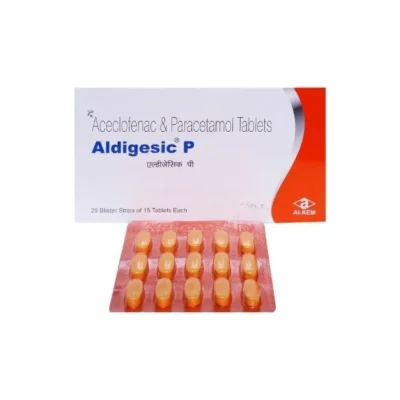💊 Aceclofenac 100mg + Paracetamol 325mg Tablet Overview
Introduction
Aceclofenac 100mg + Paracetamol 325mg is a commonly prescribed combination medication used to relieve pain and inflammation in various conditions such as osteoarthritis, rheumatoid arthritis, ankylosing spondylitis, dental pain, and musculoskeletal injuries.
🧪 Ingredients and Their Use
-
Aceclofenac (100mg): A non-steroidal anti-inflammatory drug (NSAID) that works by inhibiting the action of cyclooxygenase (COX) enzymes, thereby reducing the production of prostaglandins (chemicals responsible for pain, swelling, and inflammation).
-
Paracetamol (325mg): Also known as acetaminophen, it works mainly in the brain to block pain signals and reduce fever. It enhances the pain-relieving effects of Aceclofenac and helps control fever if present.
💡 How to Use
-
Dosage: Typically taken 1 tablet twice daily after meals to minimize gastrointestinal irritation.
-
Administration: Swallow the tablet whole with water. Do not crush or chew unless advised.
-
Duration: Follow your doctor’s instructions. Avoid long-term use without medical supervision.
🤕 Common Side Effects
-
Nausea or vomiting
-
Indigestion or abdominal pain
-
Diarrhea or constipation
-
Dizziness or drowsiness
-
Heartburn
These side effects are usually mild and temporary. Taking the tablet with food may reduce gastric discomfort.
⚠️ Serious Side Effects (Seek Immediate Medical Help)
-
Stomach ulcers or bleeding (black or bloody stools, vomiting blood)
-
Liver damage (yellowing of the skin/eyes, dark urine)
-
Kidney dysfunction (reduced urine output, swelling of legs/feet)
-
Allergic reactions (rash, itching, swelling, breathing difficulty)
-
Elevated blood pressure or worsening heart conditions
Such effects are rare but may occur with long-term or high-dose use.
🩺 Monitoring & Follow-Up
-
Liver function tests (LFTs): Paracetamol can affect liver enzymes, especially in overdose.
-
Kidney function tests (KFTs): NSAIDs like Aceclofenac can impair kidney function.
-
Complete blood count (CBC): To monitor for signs of gastrointestinal bleeding.
-
Blood pressure monitoring: Required for patients with cardiovascular risk.
-
Regular follow-up: Especially in elderly patients or those with chronic illnesses.
⚠️ Warnings & Precautions
-
Avoid alcohol: Increases the risk of liver damage with paracetamol.
-
Pregnancy & lactation: Use only if clearly needed and prescribed.
-
Pre-existing conditions: Caution in patients with liver disease, kidney disease, or peptic ulcer.
-
Driving or operating machinery: May cause dizziness or drowsiness.
-
Drug interactions: Avoid with other NSAIDs, blood thinners (warfarin), or certain antibiotics.
📌 Summary
Aceclofenac 100mg + Paracetamol 325mg is an effective combination for short-term relief of pain and inflammation. It offers synergistic action—Aceclofenac for inflammation and Paracetamol for pain/fever. However, it should be used under medical supervision due to risks of liver, kidney, and gastrointestinal side effects, especially with long-term use. Regular monitoring and adherence to dosing guidelines ensure both efficacy and safety.
Note: This information is intended for educational purposes and should not replace professional medical advice. Always consult a healthcare provider for personalized guidance.





Reviews
There are no reviews yet.